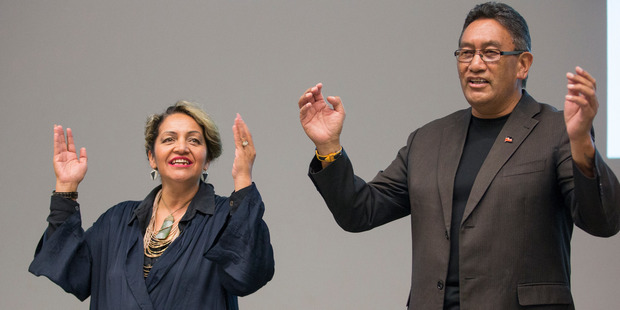MANA Tai Tokerau Campaign Team
Should Hone win his seat in Tai Tokerau and take a List MP with him into Parliament- MANA will be a useful ally in the formation of a coalition government. Just Waiting for the Phone Call.
The MANA Movement & Māori Party kawenata agreement to not stand against each other in Tai Tokerau and Waiāriki during the upcoming election is a practical move. It is common in hapu and Iwi politics to form a working agreement for the purpose of Kotahitanga ie to work together for specific outcomes. The agreement lasts until 5pm election day.
Manaakitanga and whanaungatanga are key practices in tangihanga and huihui Māori which force enemy and foe alike to shake hands and work together and prevents Māori living an insular life. Our communities are too small in Tai Tokerau to sulk with each other too long,so we have to get on and always be considerate in our Facebook comments.
When the smoke dies down, on September 23rd it is yet to be seen who wil be left standing, who will be able to cobble a government together. So it is also important for Māori commentators to help shape the media spins. We should not echo or heed the gloom and doom failure prophecies that litter the current media landscape- because they dont understand the potential of Māori dynamics.
WHAT ARE COMMONALITIES BETWEEN MANA AND MĀORI?
- Both rōpu have had long and significant involvement with kaupapa Māori issues pertaining to : Te Whakaputanga, Te Tiriti o Waitangi, 3% post Treaty settlements, the revitalisation of reo, social service and health provision; The Declaration of Rights of Indigenous Peoples, work unions, Māori Wardens, Hāhi Māori, Marae, Sports organisations, waka building, as well as running successful models of kura kaupapa Māori, kura a Iwi, Rumaki reo, KuraReo Rua, Kohanga Reo and Puna Reo.
- Both rōpu know frustration with bureaucracy and must translate that energy into creating and supporting positive models that are beneficial to narrowing the gaps of inequality- in the case of MANA not just for Māori but for and with Pasifika and others.
- The 7 Māori seats are critical to represent the voices of Māoridom. 10 more Māori seats would be more equitable for the size of the regions Māori MPs have to cover.
- Both MANA Movement and Māori Party are pēpi in the current parliamentary system and so must create their own safe space utilising Tikanga Māori , rather than fit a prescribed National or Labour Party model. Dr Whata Winiata acknowledged in 2011 “there is room for more than one Māori political party in parliament.”
- There is genuine goodwill to help win gains for many Māori whānau who continue to suffer huge inequalities in Aotearoa and a need for proactive stances of Kotahitanga amongst all Māori MPs is necessary to win significant gains for Māori;
HOW WILL MANA AND MĀORI DEAL WITH DIFFERENCE?
- This is 2017 election year. Māori voters will support policies which protect Māori land, wai and the future of our mokopuna in Aotearoa.
- Kaumātua and kuia genuinely want MANA and Māori to work together, but liken policy differences to the rangatiratanga of hapu to make decisions for themselves and respect the differences.
- For survival , all Māori politicians understand they must heed the word of kaumātua, kuia and their constituents- not to do so is perilous. Advisors must be made up of community people not just Crown officials.
- Māori voters want to see their nawe (grievances) bear fruit and political advances be seen to be won without compromising MANA MĀORI. Young people want jobs and positive forecast for the future in Aotearoa otherwise we will lose our greatest cultural capital to another country.
- Tipene Old Boys may distinguish house competitons as the natural cause of difference, but they remind both Hone and Te Ururoa to play on the same team against the hoariri.
- Leadership will need to embrace earned inclusion of women and youth and use good tikanga in that inclusion.
- Under the kawenata both parties are free to criticise each others policies – but not the tangata. Behind the scenes, MANA and Māori Party talk with each other, how best to approach this and that. But ultimately each rōpu will make its own decisions.
The MANA National Executive will be meeting in Tamaki, March 25th

